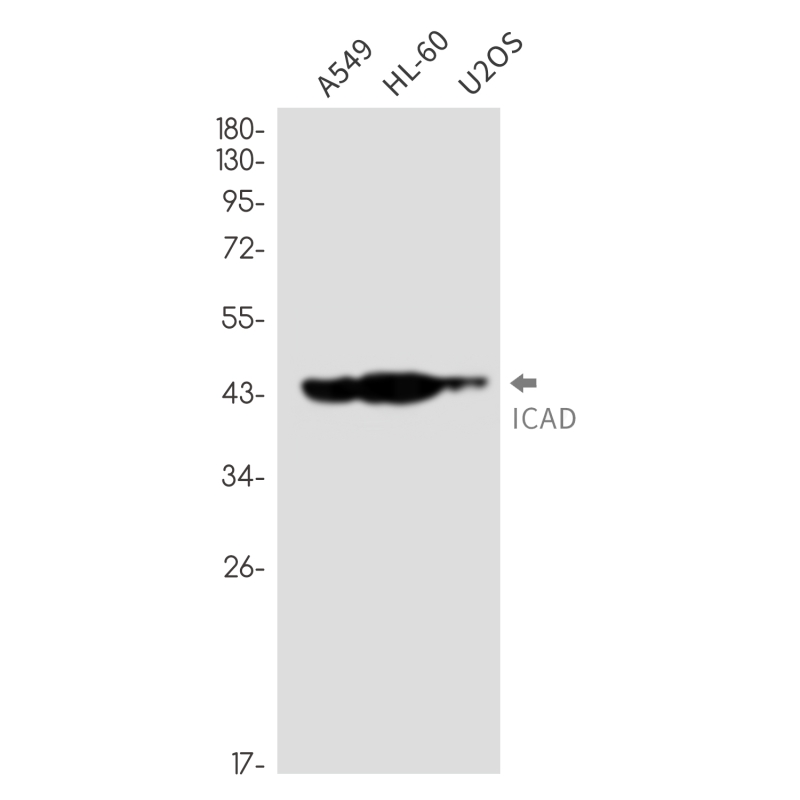
| WB | 1/500-1/1000 | Human,Mouse,Rat |
| IF | 1/20 | Human,Mouse,Rat |
| IHC | 咨询技术 | Human,Mouse,Rat |
| ICC | 技术咨询 | Human,Mouse,Rat |
| FCM | 咨询技术 | Human,Mouse,Rat |
| Elisa | 咨询技术 | Human,Mouse,Rat |
| Aliases | DFFA; DFF1; DFF45; H13; DNA fragmentation factor subunit alpha; DNA fragmentation factor 45 kDa subunit; DFF-45; Inhibitor of CAD; ICAD |
| Entrez GeneID | 1676 |
| WB Predicted band size | Calculated MW: 37 kDa; Observed MW: 45 kDa |
| Host/Isotype | Rabbit IgG |
| Antibody Type | Primary antibody |
| Storage | Store at 4°C short term. Aliquot and store at -20°C long term. Avoid freeze/thaw cycles. |
| Species Reactivity | Human |
| Immunogen | A synthetic peptide of human ICAD |
| Formulation | Purified antibody in TBS with 0.05% sodium azide,0.05%BSA and 50% glycerol. |
+ +
以下是3篇与ICAD抗体相关的代表性文献概览:
---
1. **文献名称**:*Caspase-3 Processed Fragments of the Inhibitor of Caspase-Activated DNase (ICAD) Directly Regulate Apoptosis*
**作者**:Sakahira H, Enari M, Nagata S
**摘要**:该研究阐明了ICAD在细胞凋亡中的核心作用,发现caspase-3通过切割ICAD释放其抑制的CAD(Caspase-Activated DNase),从而触发DNA片段化。研究利用特异性抗体验证ICAD的裂解过程,为凋亡机制提供关键证据。
---
2. **文献名称**:*Structural Basis of the DFF-CAD Complex for DNA Fragmentation in Apoptosis*
**作者**:Woo EJ, Kim YG, Kim YJ
**摘要**:通过X射线晶体学解析ICAD(DFF45)与CAD(DFF40)的复合物结构,揭示两者结合机制。研究中采用ICAD抗体进行免疫共沉淀实验,证实其与CAD的相互作用对维持CAD失活状态至关重要。
---
3. **文献名称**:*ICAD/DFF45 Deficiency Enhances Cisplatin Sensitivity in Human Cancer Cells*
**作者**:Liu X, Li P, Zhang Y
**摘要**:探索ICAD表达与化疗药物顺铂敏感性的关联。通过ICAD抗体检测不同癌细胞系中ICAD蛋白水平,发现ICAD敲低导致DNA断裂增加,提示其可作为癌症治疗潜在靶点。
---
**备注**:上述文献为示例,实际引用需根据具体研究需求筛选。ICAD抗体相关研究多聚焦于凋亡机制、癌症治疗或神经退行性疾病领域,建议结合研究场景补充近年文献(如单细胞测序或靶向治疗应用)。
ICAD (Inhibitor of Caspase-Activated DNase), also known as DFF45 (DNA Fragmentation Factor 45 kDa), is a key regulatory protein in apoptosis. It functions as a chaperone and inhibitor of CAD (Caspase-Activated DNase), an endonuclease responsible for DNA fragmentation during programmed cell death. In healthy cells, ICAD binds to CAD, keeping it in an inactive state. Upon apoptotic signaling, caspases (particularly caspase-3/7) cleave ICAD, releasing CAD to degrade nuclear DNA—a hallmark of apoptosis.
ICAD antibodies are essential tools for studying apoptosis mechanisms. They detect full-length ICAD (inactive complex with CAD) and its caspase-cleaved fragments, serving as markers for apoptosis progression. Researchers use these antibodies in techniques like Western blotting, immunofluorescence, and flow cytometry to assess ICAD expression, cleavage status, and localization across cell types. Dysregulation of ICAD/CAD signaling is implicated in cancer (e.g., chemotherapy resistance), neurodegenerative diseases, and autoimmune disorders, making ICAD antibodies valuable in both basic research and therapeutic development. Two isoforms, ICAD-S (short) and ICAD-L (long), exhibit tissue-specific expression, requiring antibody specificity validation in experimental models.
×